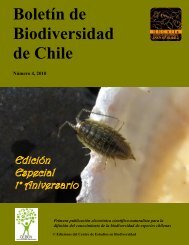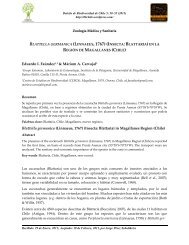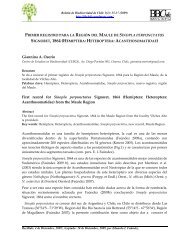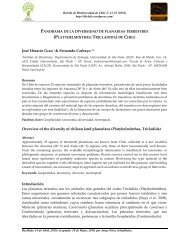PDF - boletÃn de biodiversidad de chile
PDF - boletÃn de biodiversidad de chile
PDF - boletÃn de biodiversidad de chile
You also want an ePaper? Increase the reach of your titles
YUMPU automatically turns print PDFs into web optimized ePapers that Google loves.
Boletín <strong>de</strong> Biodiversidad <strong>de</strong> Chile 2: 10-20 (2010)<br />
http://bb<strong>chile</strong>.wordpress.com/<br />
______________________________________________________________________________________________<br />
CYCLOPOIDS (CRUSTACEA: COPEPODA) REPORTED FOR CHILEAN INLAND<br />
WATERS<br />
Patricio De los Ríos 1,* , Reinaldo Rivera 1 & Juan J. Morrone 2<br />
1<br />
Universidad Católica <strong>de</strong> Temuco, Facultad <strong>de</strong> Recursos Naturales, Escuela <strong>de</strong> Ciencias Ambientales, Casilla 15-D,<br />
Temuco, Chile. 2 Museo <strong>de</strong> Zoología “Alfonso L. Herrera”, Departamento <strong>de</strong> Biología Evolutiva, Facultad <strong>de</strong><br />
Ciencias, Universidad Nacional Autónoma <strong>de</strong> México (UNAM), Apartado Postal 70-399, 04510 México, D.F.,<br />
México.* Author for correspon<strong>de</strong>nce, E-mails: prios@uct.cl and patorios@msn.com.<br />
Abstract<br />
Cyclopoids are the worst studied copepods from Chilean inland waters, because the i<strong>de</strong>ntity of the<br />
species and their occurrence reports need confirmation; there are only <strong>de</strong>scriptions for species from large<br />
and <strong>de</strong>ep Patagonian lakes (38-51º S). Chilean cyclopoids have low relative abundance in zooplankton<br />
assemblages. The scarce ecological studies indicate that they are opportunistic predators, grazing on<br />
phytoplankton or predating on small zooplankton (protists, rotifers, nauplii, copepodid stages and<br />
juvenile cladocerans). From a biogeographical view point there are en<strong>de</strong>mic species in bioegeographical<br />
regions at extreme northern and southern Chile, whereas in the Central Chile it is possible found<br />
wi<strong>de</strong>spread species that had been reported for other zones in South America.<br />
Keywords: Copepods, cyclopoids, Patagonia, zooplankton.<br />
Cyclopoids (Crustacea: Copepoda) reported for Chilean inland waters.<br />
Resumen<br />
Los copépodos ciclopoi<strong>de</strong>os han sido poco estudiados en aguas continentales <strong>chile</strong>nas, porque la<br />
i<strong>de</strong>ntidad <strong>de</strong> sus especies requiere <strong>de</strong> confirmación, solo hay <strong>de</strong>scripciones para especies <strong>de</strong> lagos gran<strong>de</strong>s<br />
y profundos <strong>de</strong> la Patagonia (38-51ºS). Los copépodos ciclopoi<strong>de</strong>os tienen baja abundancia relativa en los<br />
ensambles zooplanctónicos y los escasos estudios biológicos indican que ellos son <strong>de</strong>predadores<br />
oportunistas, pastoreando sobre el fitoplancton o <strong>de</strong>predando sobre especies zooplanctónicas <strong>de</strong> menor<br />
tamaño (protozoos, rotíferos, nauplius, estadíos copepoditos y cladóceros juveniles). Des<strong>de</strong> un punto <strong>de</strong><br />
vista biogeográfico hay especies endémicas en regiones biogeográficas como los extremos norte y sur <strong>de</strong><br />
Chile, mientras que en la zona central <strong>de</strong> Chile, es posible encontrar especies que han sido reportadas para<br />
otras zonas <strong>de</strong> Sudamérica.<br />
Palabras clave: Copépodos, ciclopoi<strong>de</strong>os, Patagonia, zooplancton.<br />
Introduction<br />
Cyclopoid copepods are among the worst studied zooplanktonic crustaceans in Chilean lakes,<br />
because this group is relatively scarce in comparison to other zooplanktonic crustaceans, such as<br />
calanoid copepods and cladocerans (Campos et al., 1994a, 1994b; Wölfl, 1996; Villalobos, 1999,<br />
Recibido: 21 <strong>de</strong> Diciembre, 2009; Aceptado: 17 <strong>de</strong> Mayo, 2010, por Erich Rudolph L.








